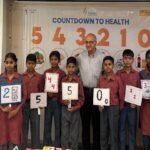Research published in Heliyon finds that linguistic pattern analysis of testimony can lead to more impartial investigations and accurate diagnoses of PTSD in cases of child sexual abuse
healthysoch
London, February 20, 2019 :
Age and post-traumatic stress disorder (PTSD) are key factors that affect how coherently sexually abused children are able to recount traumatic events, according to a new study published in the journal Heliyon. The findings show that children with post-traumatic profiles are more likely than those without PTSD to provide disjointed, inconsistent narrative testimony that is marked by distinctive linguistic indicators of unprocessed trauma cognition. However, this testimony may be credible.
“Our study contributes to the understanding of the role of age and PTSD in the narrative processing of traumatic information by sexually abused children. We indicated that more self-focused and less cohesive and reflective language in the narratives can be important indicators of post-traumatic distress,” explained lead investigator, Sarah Miragoli, PhD, Psychology Department, Catholic University of the Sacred Heart, Milan, Italy. “When it comes to clinical and legal evaluation of victims’ testimony, our study supports consideration of quantitative linguistic analysis as a tool for improving the impartiality of investigations and the accuracy of diagnoses.”
Language is the most common way to communicate internal states and emotions into a narrative form. Studies on the use of language provide a valuable understanding of how people process an event and interpret it. Traumatic narratives are often described as incomplete, fragmented and incoherent, which can be considered a reflection of the memory and emotional difficulties in encoding, processing and integrating the traumatic event into the autobiographic memory. People experiencing physical or emotional pain tend to focus their attention on themselves and subsequently use more first-person singular pronouns. Changes in the use of singular personal pronouns and an increase in conjunctions, and causal and insight words can represent important markers of recovery and mental wellbeing.
This study investigated the effects of PTSD on the linguistic characteristics of interview reports sourced from court documents from 89 children, aged 4-16, who were victims of sexual abuse. Thirty-seven children had symptoms consistent with a diagnosis of PTSD using the formal DSM IV-TR (APA, 2000) criteria. The depositions were analyzed using Linguistic Inquiry Word Count (LIWC) identifying certain linguistic markers (first-person singular pronouns, conjunctions, and cognitive words). In particular, the analyses concluded that PTSD diagnosis is associated with the greater use of first-person singular pronouns (e.g., I) and fewer conjunctions (e.g., and, or), and cognitive words (e.g., think, believe, know); and that younger age is associated with fewer conjunctions and cognitive words (especially insight and causal words). The narratives of the young children and of children with trauma profiles exhibited less coherence in how thoughts were interrelated and how events were sequenced (e.g., temporally, causally).
These findings underline the importance of considering age and PTSD status in legal testimony of children who have been sexually abused. Prof. Miragoli observed, “In legal settings, the narrative consistency of depositions is often associated with the credibility of the witness. Our findings, on the other hand, open the possibility that the narrative fragmentation may be an indicator that the traumatic event has occurred.”
Several studies have illustrated that narrative disorganization can be associated with a PTSD profile in adults. “Traumatic narratives become more coherent and organized as PTSD symptoms decrease throughout exposure to therapy. These considerations can also be valid in the treatment of traumatized children, and the narrative processing of trauma can become an effective therapeutic tool,” concluded Prof. Miragoli.
Healthy Soch







